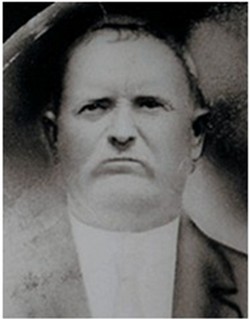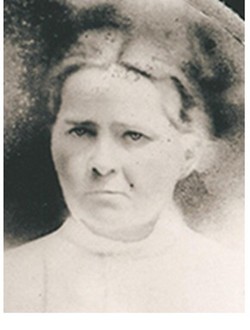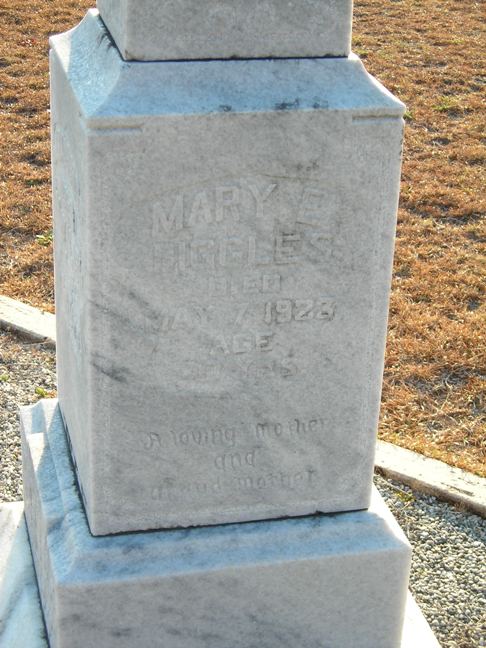In October of 1899, James Thomas Beagles, aka J. T. Biggles, of Rays Mill, GA sat in the Berrien County jail in Nashville. At that time the jailhouse was a log building that had been constructed some 25 years earlier. Beagles was being held for trial for the 1887 killing of his brother-in-law on the steps of Henry H. Knight’s store at Rays Mill.
At that 1899 term of the Superior Court of Berrien County, the jail where Beagles and 11 other prisoners awaited trial was found by the Grand Jury to be in deplorable condition.
Tifton Gazette
Oct. 13, 1899 — page 1GENERAL PRESENTMENTS
Returned by the Grand Jury, October Term, Berrien Superior Court.
We, the Grand Jury, chosen and sworn to serve at this term of the court beg leave to submit the following General Presentments:
We have examined the jail of our county and find it in bad sanitary condition, owing to the size and arrangement of said building, the same being entirely too small and badly arranged, prisoners having to be crowded together, male and female. We attach no fault whatever to the sheriff and jailer in charge, believing that he is doing all in his power to keep the same in order under existing circumstances. And we recommend that our Board of County Commissioners, at as early date as is expedient, build a new jail house and procure sufficient jail cells and arrange said building and cells so as to keep sexes separate and apart, as well as white and colored persons incarcerated therein, considering as we do the present jail a disgrace to the county…
Despite the findings of the Grand Jury, it would be another four years before the now historic building now known as the “old jail” was constructed.
The Berrien Superior Court convened that fall on Monday, October 9, 1899 with Judge Augustin H. Hansell presiding, and Jonathan Perry Knight acting as Clerk of the Superior Court. The docket was full that session and the judge postponed the civil cases, dismissing the witnesses, in order to get on with the trial of the criminal cases. Among the Grand Jury members were Warren L. Kennon, Henry Griffin, and Jonathan L Herring, editor of the Tifton Gazette. Silas Tygart served as clerk, and the jury members selected for their foreman, Malcolm J. McMillian.
Ex-Senator M. J. McMillian, of Alapaha, is not an office-seeker, but the people know him to be an honorable and upright man, and insist on having his services. He is foreman of the grand jury this week, though he hid, in an effort to escape the honor when the jury was about to make the selection.
– Ocilla Dispatch.
In addition to the charge of murder against James Thomas Beagles, the criminal docket included: Emma Reese charged with assault and attempted murder; Jim Oscar Stearns charge with the murder of Amos White; Warren G. Moss on the charge of burglary at Lenox; Allen Cooper charged with the killing of Philip Johnson at Kissemmee, FL; Rachel Thomas on counts of assault and battery; John Davis for burglary of the store of Mr. I.D. Ford; Robert Bell for simple larceny from Mr. W.M. Thurman; North Cochran for highway robbery.
The session of the superior court drew a significant crowd, and so was also prone to interruptions of every sort.
The woman “with the hoe” turned up at the last session of Berrien superior court. She was colored, lived near Cecil, and laid open the cheek of another woman during a rucus, with that useful plantation instrument.
The attorneys arguing before the court were colorful and well-known characters of the Wiregrass judicial circuits. Colonel Hammond, for example, was one of the prosecuting attorneys but was himself facing prosecution for shooting and wounding Colonel A. L. Hawes at Thomasville the week before.
But it was the Beagles case that generated the most interest. The case had dragged over a decade because of the flight and subsequent return of Beagles. Beagles was defended by Col. William Hamilton Griffin, who was judge of the Valdosta City Court and a former mayor of Valdosta. Col. Griffin was a native of Berrien County and had served previously as clerk of the Berrien County court and as Ordinary of Berrien County.
SUPERIOR COURT IN SESSION.
Berrien’s Mills of Justice at their Semi Annual Grind.
Berrien’s superior court convened Monday morning at ten o’clock, that grey-haired veteran of the bench, Judge Aug. H. Hansell, presiding. Besides the county bar, those of Worth, Lowndes, Thomas, Colquitt and Albany were well represented.
The grand jury organized by electing Hon M. J. McMillan foreman and Silas Tygart clerk, and after an able and comprehensive charge from his honor, settled down to work, with a volume of business before it.*****
Nashville, Oct. 10. – The entire day (Tuesday) in superior court has been consumed in the trial of Thos. J. Beagles for the killing of Madison G. Pearson, at the justice court grounds at Ray’s Mill, Nov. 4th, 1891. [Note: actual date was 1887]
Beagles had married Pearson’s sister, and to this marriage Pearson was violently opposed. Growing out of this opposition, there was bad blood between the two for a year or more, and Pearson had threatened Beagles’ life, and gone to his home and cursed him in the presence of his wife.
Beagles then swore out a peace warrant against his brother-in-law, on which he was arrested and gave bond for his appearance at justice court the next day.
In the court house the row was again raised, and Pearson invited Beagles out to fight him, starting out at the door and pulling off his coat as he did so. As Pearson was on the steps, going down, Beagles, who was standing near, drew a pistol and shot him in the side of his head, killing him instantly.
Beagles then went to Florida, where he staid [sic] several years, and on his return was arrested and finally admitted to bail.
Sometime ago, Beagles’ bondsmen gave him up, and he has been in jail for two months.
At the trial to-day, the state was represented by Solicitor-Gen. Thomas and Col. W. M. Hammond, while Cols. Jos. A. Alexander and W. H. Griffin represented the defendant.
The battle has been a hard-fought one throughout the day, and every point of the evidence thoroughly sifted. At adjournment to-night, the fight is not concluded, Cols. Thomas and Alexander having addressed the jury, while Cols. Griffin and Hammond will address them tomorrow.*****
Oct. 11. – The morning session of superior court was occupied with the speeches of Cols. Griffin and Hammond on the Beagles case. That of Col. Griffin, for the defendant, was a masterly arrangement of law and evidence in behalf of his client, and delivered in the clear, concise manner for which Col. Griffin is so well known.
The argument of Col. Hammond was eloquent and strong, well supported by law, and his arrangement of the prisoner was scathing and masterly. The arguments were concluded before one o’clock, and Judge Hansell delivered his charge to the jury before adjourning for dinner.Oct. 13 … Judge Griffin made a most eloquent and affecting appeal in behalf of his client, Beagles, for a light sentence, and every one in the court room was moved by his strong and well-chosen words.
Sentences were then pronounced as follows…J. A. Beagles, white, convicted of manslaughter, with recommendation, two years in penitentiary.
But James Thomas Beagles did not spend his two year sentence in the penitentiary. The very same issue of the Tifton Gazette that carried the outcome of the October 1899 term of the Superior Court of Berrien County also carried an interesting note on the convict lease system:
“There is a big boom in the value of state convicts. Recently there has been a strong demand for the convicts, and lessees under the new system are anxious to get all the men that they can even at advanced prices”
Under the convict lease system, J. T. Beagles was sent to the convict camp at Fargo, GA. G.S. Baxter & Company operated the convict camp at Fargo to provide labor for the firm’s large sawmill operation. The sawmill at Fargo was the largest in Clinch County, and by 1903 the State Prison System of Georgia was leasing more than 1,000 convicts to the firm. (see Connie Moore and the Fargo Convict Camp)
After serving his sentence, J. T. Beagles returned to Ray City to make his home and work.
Related Posts:
- Biggles case was tried by Judge Hansell
- Beagles/Biggles/Beigles of Rays Mill
- The Biggles Farm
- More on the 1887 Family Feud at Rays Mill, GA
- 1887 Family Feud at Ray’s Mill
- Judge Hansell: Distinguished Man of Georgia
- James B. Griner Once Deputy Sheriff of Berrien County
- The Pioneer Corps
- Connie Moore and the Fargo Convict Camp
- The State vs Burrell Hamilton Bailey
- Last Hanging in the Old Berrien Jail (Berrien Historical Foundation)













